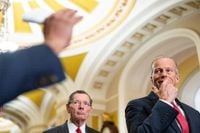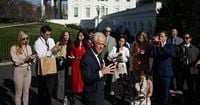President Donald Trump is set to unveil a sweeping set of tariffs this Wednesday, April 2, 2025, which he has dubbed "Liberation Day." This momentous announcement is expected to include a variety of import taxes aimed at reshaping the U.S. trade landscape, significantly impacting American consumers and the global economy.
Trump's proposed tariffs are not just limited to a select few countries; rather, he plans to impose them on a wide range of nations, including the European Union, South Korea, Brazil, and India. The President stated, "We’re going to charge countries for doing business in our country and taking our jobs, taking our wealth." This rhetoric underscores his long-held belief that the U.S. has been unfairly treated in global trade.
Among the specific tariffs, Trump announced a 25% tax on auto imports, which has raised concerns among economists regarding the potential consequences for American consumers. Economist Art Laffer estimates that these tariffs could increase the cost of vehicles by as much as $4,711. This comes at a time when the economy is already showing signs of slowing, with Goldman Sachs projecting a mere 0.6% growth rate for the current quarter, down from 2.4% at the end of the previous year.
In addition to autos, Trump aims to impose tariffs on a variety of goods, including pharmaceutical drugs, copper, and lumber. He has also signaled a 25% tariff on oil imports from Venezuela and additional taxes on goods from China due to its involvement in fentanyl production. These measures are part of a broader strategy to reduce the trade deficit and bring manufacturing jobs back to the United States.
While Trump remains optimistic about the potential benefits of these tariffs, many economists warn of dire consequences. They predict that the tariffs will lead to higher prices for everyday goods, including groceries and housing. Mayor Andrew Ginther of Columbus, Ohio, indicated that tariffs could increase the median cost of a home by $21,000, further exacerbating the affordability crisis in the housing market.
White House trade adviser Peter Navarro has been a vocal supporter of the tariffs, claiming they could generate up to $600 billion annually in federal revenue. Navarro stated, "Tariffs will make America great again," emphasizing that the administration views these measures as a means to bolster the economy and create jobs.
However, the international reaction has been largely negative. Canadian Prime Minister Mark Carney has expressed that Trump's tariffs have damaged the longstanding partnership between the U.S. and Canada. French President Emmanuel Macron criticized the tariffs as "not coherent," warning that they would disrupt value chains and create inflation, which ultimately harms both the American and European economies.
As the tariffs loom, global stock markets have reacted negatively, with significant declines observed in Asia and Europe. The Nikkei 225 in Japan fell over 4%, while the FTSE 100 in the UK dropped by approximately 1.2%. Investors are increasingly concerned about the potential for a trade war and its implications for economic stability.
In the U.S., the political landscape is also shifting in response to the impending tariffs. Senators are expected to vote this week on measures aimed at stopping Trump's tariffs on Canadian imports. Senator Tim Kaine, D-Va., is pushing for a vote to terminate the national emergency declaration that Trump used to impose these tariffs. Kaine stated, "President Trump’s taxes on Canadian goods have sent our economy into chaos, and Americans aren’t buying what he’s selling." This sentiment reflects growing frustration among lawmakers regarding the economic impact of the tariffs.
Despite the pushback, Trump has remained steadfast in his approach. He claimed that the tariffs would be "more generous" and "kinder" than the treatment U.S. exports have received from other countries. This assertion, however, is met with skepticism as many economists predict that the tariffs will ultimately lead to higher consumer prices.
The Trump administration's mixed messages regarding the economic impact of the tariffs have left consumers confused. While Navarro insists that the tariffs won't lead to inflation, he also acknowledges that there will be short-term economic pain. He argued that any difficulties faced by consumers would be offset by a forthcoming tax bill aimed at extending Trump’s 2017 tax cuts.
As the administration prepares for "Liberation Day," it remains to be seen how the tariffs will reshape the economic landscape. With the potential for retaliatory measures from other nations, the U.S. could find itself in a precarious position. Trump’s tariffs could serve as a catalyst for a broader trade war, with consequences that extend far beyond the immediate economic impact.
In the midst of this uncertainty, Trump has also indicated that he is open to negotiating with other nations, stating, "I’m certainly open to it, if we can do something." This suggests that while the tariffs may be a primary focus, there is still room for diplomacy in the administration's trade strategy.
As the clock ticks down to April 2, the stakes are high. The implications of Trump's tariffs will not only affect U.S. consumers but could also alter the dynamics of international trade. With economists and political leaders closely watching the developments, "Liberation Day" could prove to be a pivotal moment in U.S. economic history.








